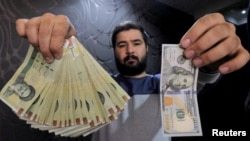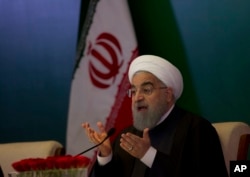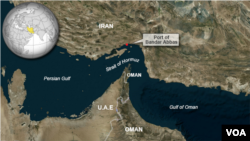As an August 4 deadline approaches for the first round of new U.S. sanctions on Iran, the war of words between Tehran and Washington has prompted some Mideast commentators to question if a conflict might break out.
But Iran's currency, the riyal, has hit a record low of 95,000 to the dollar, losing more than half its value since the start of the year and putting pressure on the government to do something.
Iranian President Hassan Rouhani ignited a flurry of speculation over how Tehran would react to the sanctions, saying over the weekend war between Iran and the U.S. "would be the mother of all wars," and that "peace with Iran would be the mother of all peace [agreements]," leaving the door open to both options.
Iran also said it is giving the European signatories to the 2015 nuclear deal (JCPOA) until August 6 to find a way to allow it to continue exporting some of its oil.
Not to be outdone, U.S. President Donald Trump warned Iran in a tweet to "never, ever threaten the United States again or you will suffer the consequences the likes of which few throughout history have ever suffered before."
Former Iranian President Abolhassan Bani-Sadr told VOA he thinks both leaders have entered into a shouting match "because neither has any real strategy, just childish games and childish rhetoric. If either of the men had a solution," he said, "we would have heard it by now."
"there are just three solutions to the crisis, not a thousand," argued Bani Sadr.
In his view, Tehran will come out the loser in each case.
"The simplest solution is for Iran to accept the diktat from Washington and to start negotiating," he said.
He called this the "North Korea option."
"After trading insults," he added, "both sides will adopt a friendly stance and negotiate."
"Blocking the Strait of Hormuz is the least palatable solution, because it would mean war," he said. "It would also mean total economic suffocation for Iran and its consequences would be intolerable, not just for Iran, but for Europe and Asia, as well, if perhaps less so for the U.S."
Bani-Sadr also noted this would also signify "total failure" for everything President Rouhani has done in the last five years.
Khattar Abou Diab, who teaches political science at the University of Paris, doubts Iran would resort to blocking the Strait of Hormuz, either.
"It is important to remember that the first Gulf War [1981-1988] lasted seven years," he said. "And despite all the death and destruction, there was a total stalemate until Iran made the fatal mistake of attacking oil tankers."
"Iran," he recalled, "made the further mistake of attacking Kuwaiti ships that had begun flying U.S. or European flags for protection, provoking a very strong reaction by the U.S. 5th Fleet, and ultimately leading to U.N. intervention and Iran's defeat."
"This prompted Iran's then-supreme leader, Ayatollah Ruhollah Khomeini, to very famously state that he would 'drink the poison' and accept the U.N. resolution to stop the war," he said.
"If Iran does anything to retaliate against the U.S. for the new economic sanctions," argued Abou Diab, "it will more likely be in Syria or Iraq, and not in international [shipping lanes]."
Veteran Saudi political commentator Jamal Kashoggi also doubts Iran would try to block the Strait of Hormuz or stop oil traffic in the Persian Gulf.
"That would be an act of war in addition to being very bad PR," he said. "They would have the whole world against them if they did that."
Khashoggi argued that Saudi Arabia "welcomes the strong U.S. position against Iran" and said Riyadh is also "active in the war of words with [Tehran].
He noted that Saudi ambassador to Washington Prince Khaled Ben Salman "lashed out against Iran in an article several days ago in the daily Arab News."
"Saudi Arabia is pushing for a stronger position against the Iranians," he said, "since it believes the Iranians will not behave or change except through pressure."
He said other Gulf states "will adopt a more cautious stance on Iran because they have more [business dealings] with the Iranians."
Khashoggi said Iran "may be seeking a 'grand deal' with the U.S." involving its position in Syria, Yemen, and its nuclear and ballistic capabilities.
"Iran is already negotiating with Israel over its position in Syria through the Russians," he pointed out. "It is unfortunate for the Arabs, though, that the future of Syria is being determined by Israel, Russia and Iran. It shows how weak the Arabs have become."











